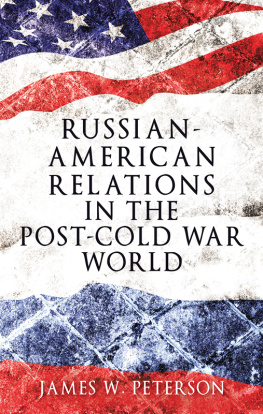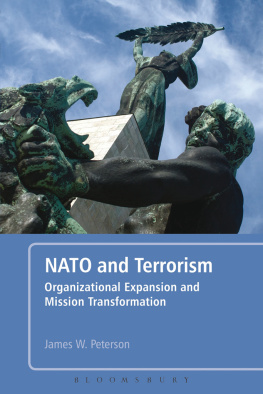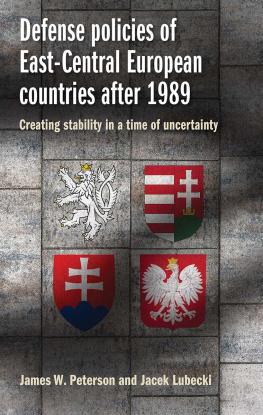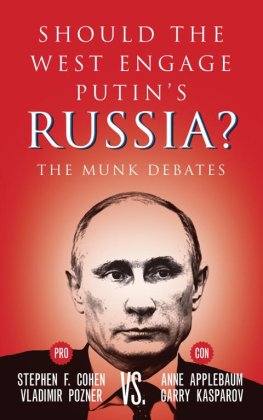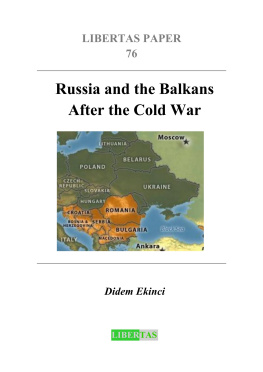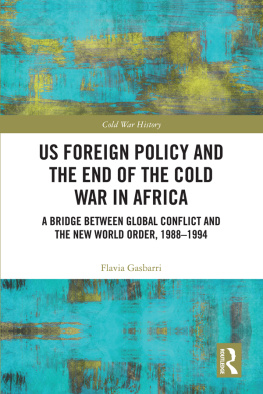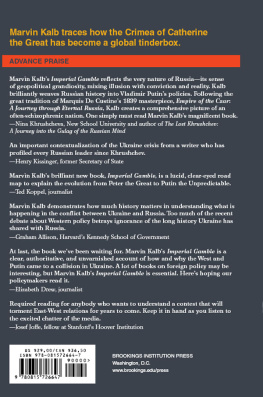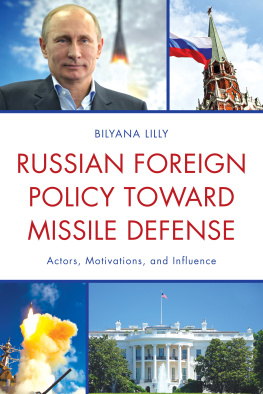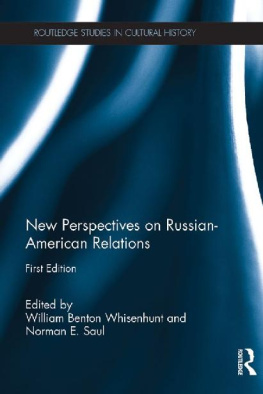Russian-American relations in the post-Cold War world
James W. Peterson
Manchester University Press
Copyright James W. Peterson 2017
The right of James W. Peterson to be identified as the author of this work has been asserted by him in accordance with the Copyright, Designs and Patents Act 1988.
Published by Manchester University Press
Altrincham Street, Manchester M1 7JA
www.manchesteruniversitypress.co.uk
British Library Cataloguing-in-Publication Data
A catalogue record for this book is available from the British Library
ISBN978 1 5261 0579 0paperback
ISBN978 1 5261 0578 3hardback
First published 2017
The publisher has no responsibility for the persistence or accuracy of URLs for any external or third-party internet websites referred to in this book, and does not guarantee that any content on such websites is, or will remain, accurate or appropriate.
Typeset
by Toppan Best-set Premedia Limited
This book is dedicated to Bonnie, Jesse, Jenna, Azeez, and Ayan
The author would like to acknowledge the strong support from the members of the Department of Political Science at Valdosta State University. There has been mutual appreciation for the research projects of each other as well as readiness on the part of many to interact in a meaningful way with faculty members at institutions in the former communist bloc. He also acknowledges our vital connections with faculty members in the partner Department of Politics and European Studies at Palack University in Olomouc, Czech Republic. Each of them has shared the memories and experiences of what life was like in the period under communist control as well as in the period after its ending. The positive interactions of the faculty members in these two departments are particularly important to the author, who spent several years as a translator on the old West GermanCzechoslovak border in an effort to defend against the threat that emanated from the communist bloc. It is important to remember and celebrate the positive changes that have taken place in recent decades.
The author would also like to acknowledge the excellent work of the editorial staff at Manchester University Press, in particular Tony Mason, Rob Byron, Alun Richards, and David Appleyard, and of copy-editor Judith Oppenheimer.
Russian State Anthem (Verses 1 and 2, translated by Fabio Lazzati)
Russia, you are our sacred Power!
Russia, you are our beloved land!
The mighty will and the immense glory
Here is your heritage in any predicament.
Our woods and our fields extend
From the southern seas as far as the North Pole.
You are a one in the world! You are quite a one,
Native land protected by God.
The Star Spangled Banner (Verse 4, Francis Scott Key, 1814)
Oh! thus be it ever, when freemen shall stand
Between their loved home and the war's desolation!
Blest with victory and peace, may the heav'n rescued land
Praise the Power that hath made and preserved us a nation.
Then conquer we must, when our cause it is just,
And this be our motto: In God is our trust.
And the star-spangled banner in triumph shall wave
O'er the land of the free and the home of the brave!
| ABM | anti-ballistic missile |
| APEC | Asia-Pacific Economic Community |
| CFE | Conventional Forces Europe |
| CIA | Central Intelligence Agency |
| CIS | Commonwealth of Independent States |
| CPSU | Communist Party of the Soviet Union |
| CSTO | Collective Security Treaty Organization |
| EU | European Union |
| G8 | Group of Eight |
| ICBM | intercontinental ballistic missiles |
| INF | Intermediate Nuclear Forces |
| ISIS | Islamic State in Iraq and Syria |
| NAC | North Atlantic Council |
| NATO | North Atlantic Treaty Organization |
| NRC | NATORussia Council |
| OSCE | Organization for Security and Co-operation in Europe |
| PfP | Partners for Peace |
| SALT | Strategic Arms Limitation Treaty / Strategic Arms Limitation Talks |
| SCO | Shanghai Cooperation Organization |
| START | Strategic Arms Reduction Treaty |
| TPP | Trans-Pacific Partnership |
| WMD | Weapons of Mass Destruction |
Russia and America are two large and powerful eagles that share the perspective that their destiny in the world is a very special one. Both celebrate that unique status in the anthems that they integrate into special events such as presidential inaugurations. Each anthem emerged at a unique and parallel time in the history of the nation. For Russia, its current anthem became official a decade after the implosion of the Soviet Union and the emergence of the modern state. In the American case, the anthem has been in place for two full centuries and emerged in the midst of a war in which the new nation defeated its former colonial power for a second time, several decades after the first victory. Both nations and peoples draw inspiration from a much deeper well of historical experiences that the two anthems evoke. For Russia, there is a striking parallel between the soaring words of the current state hymn and the original one written in 1791 to commemorate the outreach of Catherine the Great into the former Polish kingdom as well as the far-off Black Sea region. For America, its anthem evokes memories of an expansive nation that once huddled on the shores of the Atlantic but eventually incorporated all the territory to the Pacific Ocean and beyond. In their official anthems, both nations have essentially created hymns of religious intensity to the God that opened these doors and bestowed his blessing on the results.
It is time to take a careful look at the road that these two nations have traveled in the first quarter-century of the post-Cold War era. There is no question but that it has been a bumpy one.
In fact, the ambiguity and misperceptions of the period have roots in the late-Cold War period. Pursuit of dtente agreements coincided with both tough actions by the Brezhnev regime near the Soviet border and a significant build-up of military capabilities by the Reagan administration. It should be no surprise that this potent mixture of contradictory expectations exploded once more with the crisis over Crimea and the Ukraine in 2014 and after. Once again, there was concrete evidence of both Russian aggressive outreach and a stiffening of American/NATO (North Atlantic Treaty Organization) resolve to stand up and put a stop to those purposeful moves from the East. It is important for both scholars and practitioners to develop models and action plans that can guide and nudge this turbulent relationship into predictable channels that can calm the waters. This Prologue will outline a book that will clarify some of these questions and offer hope for a more predictable relationship.
will outline important theories of great-power conflicts that can illuminate certain features of the complicated RussianAmerican relationship. Key concepts that will receive attention include those theories that center on the balance of power, bipolarity, unipolarity, multi-polarity, and continuous chaos. It is possible to notice elements of each theory in the relationship between the two powers at different points in the period after 1991. The mutual search for allies through NATO expansion by the West and through the creation of structures such as the Commonwealth of Independent States (CIS) and the Eurasian Economic Community by the East conjure up images of at least the possibility for an equitable position between Moscow and Washington. Their unrelated pivots toward Asia provide another picture of potential balance between the two. Bipolarity may be an accurate way of depicting the mutual understanding between the two nations and sets of leaders after the 9/11 attacks in 2001. Russian leaders then hoped that their American counterparts would now understand what they had been facing with the terrorist attacks that had their origins in the Caucasus. This may explain in part the Russian willingness to permit American access to two military bases in Central Asian countries that had been part of the old Soviet Union.

